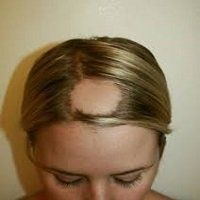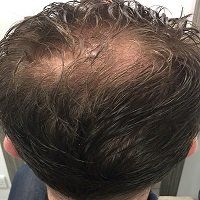Central Centrifugal Cicatricial Alopecia
(CCCA)
Suffering with CCCA?
Experiencing thinning or scarring at the crown? Centrifugal cicatricial alopecia needs early treatment - book your consultation today.
Book an Appointment
Speak directly with a qualified trichologist and get clear, practical advice.
What is Central Centrifugal Cicatricial Alopecia?
Originally known as ‘Hot Comb Alopecia’ Central Centrifugal Cicatricial Alopecia CCCA, a scarring alopecia often presents itself as an irregular area of shiny bald skin, moving from the top of the head spiralling outwards towards the rear.
It is sometimes a darker or lighter colour than the scalp that is surrounding it. There will be broken hairs with some crusting or scaling and the scalp may look ‘wrinkly’ when pressed together and may appear keloid/scarred.
Central Centrifugal Cicatricial Alopecia
Central Centrifugal Cicatricial Alopecia (CCCA) is an inflammatory, Genetic, auto immune disease which spreads from the vertex (top) of the head in a circle, outwards.
What Causes Central Centrifugal Cicatricial Alopecia(CCCA)?
Excessive Scratching
Excessive scratching can cause micro injuries to the scalp, which then become infected. If the infection moves deeper into the skin, scarring can result, causing hair loss in this area.
Locs (Sisterlocs) and dreadlocks
Poorly installed locs can cause traumatic scarring to the scalp. The follicles miniturise and the weakened hair breaks. and there can be continual soreness and irritation in the area of hair loss.
Patients often indicate or point to a specific area on their scalps, saying "it burns" or "it is sore right here".
Thermal trauma
If tongs, hair straighteners and hairdryers are used on the hair without thermal protection the CCCA can occur. Particularly if they are held at close proximity to the scalp.
Hot oils
Oil can sensitise the scalp, causing inflammation as it is an irritant. Dehydrates the hair and casues the hair to snap.
Chemical trauma
When the sodium hydroxide used in Relaxer on Afro hair, with a pH of between 10 and 12 (making it a highly alkaline substance) can burn the scalp skin, and cause a secondary infection, resulting in a scarring Alopecia.
Other hair products including bleach or permanent hair dye can also have a similar outcome.
Who can be affected by Central Centrifugal Cicatricial Alopecia?
Many post-menopausal black women are sufferers of CCCA. The condition begins with gradual thinning, hair loss around the mid-30’s.
This continues worsening throughout the child-bearing years. CCCA is rarely seen in other racial groups.
Can you treat Central Centrifugal Cicatricial Alopecia?
It is possible to cure CCCA if it is caught and treated early. Swift treatment is of the essence, since with each subsequent hair growth cycle, the follicles diminish further.
CCCA can be controlled with topical treatments, however Firstly any scalp infection must first be treated.
How do you treat (CCCA) Central Centrifugal Cicatricial Alopecia?
Any infection can be treated with antibiotics and/or topical treatments.
At my clinic, I recommend a minimum of 6 electrotherapy treatments to encourage hair growth and this is supported with at home treatments.
Results are often promising and improvement is seen in the majority of cases. Swift action is required - the earlier the intervention the better chance of recovery.
SMP - Scalp Micropigmentation can be used to help density any thinning areas of the vertex scalp that do not recover fully or if you prefer to have a thicker looking head of hair, this technique will density the appearance of hair throughout your scalp,
Types of Alopecia
There are many different types of alopecia, all with varying causes. Some of the most common include; Alopecia Areata, Androgenic Alopecia, Centrifugal Cicatrical Alopecia, Chemical Alopecia, Frontal Fibrosing Alopecia, Telogen Effluvium and Traction Alopecia.
Hair breaking at the crown? Worried about breakage and scalp tenderness?
Unsure if your crown thinning is CCA? Fill in the form below with your question we'll guide you through your next steps.
See more hair and scalp conditions
Are you suffering from thinning hair, hair loss, patchy areas or Itchy flaky scalp? If you think you are suffering from any of the conditions you see book an appointment with your local trichologist. The sooner you start treatment the better.





